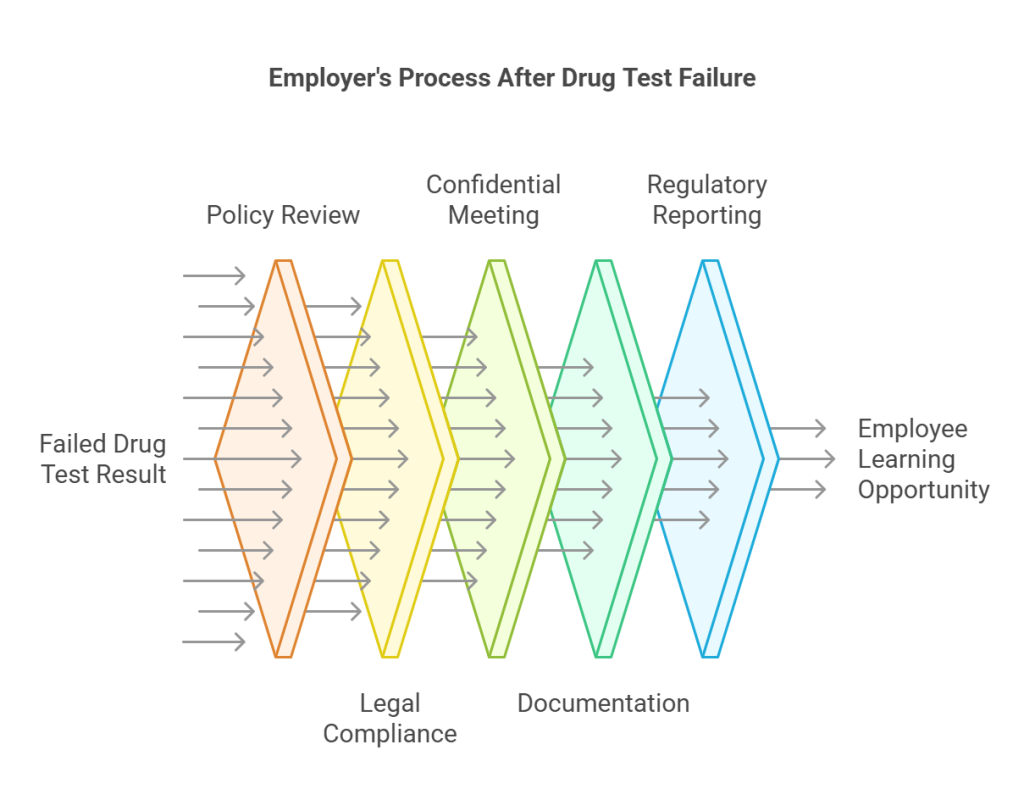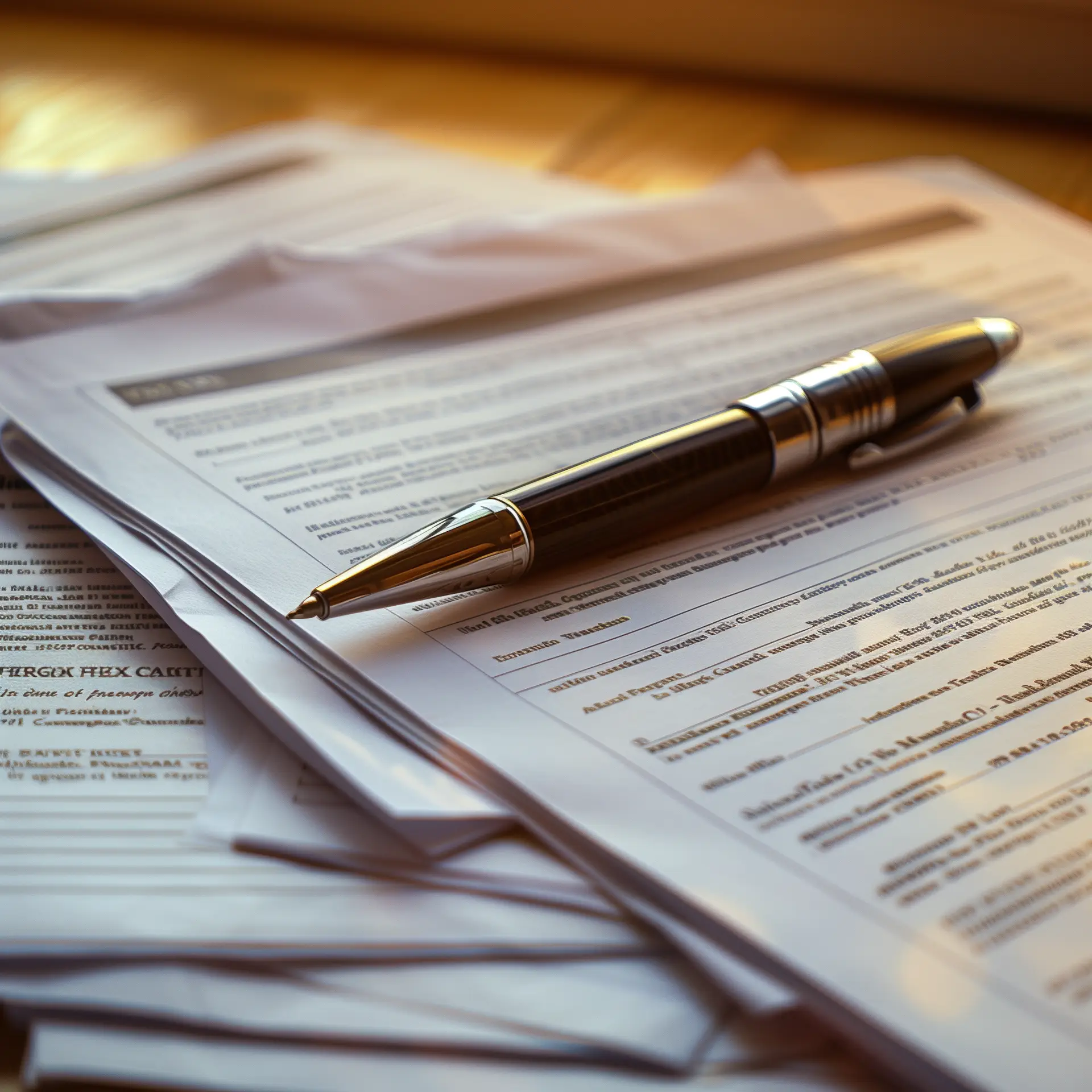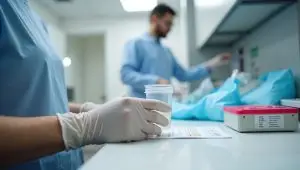In today's competitive job market, employers want to ensure they are hiring the most qualified and trustworthy candidates. One way to do this is through pre-employment screening, which often includes background checks and drug tests. But how do these processes work, and what should both employers and job seekers expect?
This comprehensive guide will break down the specifics of background checks, drug testing, and what both parties should be prepared for. Whether you're a business owner, HR professional, recruiter, or job seeker, this guide provides valuable insights tailored to your needs.
Key Takeaways
- Pre-employment screening, encompassing background checks and drug tests, is essential for ensuring the reliability and trustworthiness of potential hires.
- Background checks often include criminal history, employment, and education verification, as well as, occasionally, credit history.
- Various types of drug tests such as urine, mouth swab, and hair follicle tests have specific detection windows and substances they screen for.
- Employers must follow legal guidelines and obtain candidate consent, while employees have rights regarding the testing process and can contest false positives.
- Proper preparation, clear communication, and understanding of the tests and their implications benefit both employers and job seekers in creating a safe and efficient workplace.
Introduction
In today's rapidly evolving job market, pre-employment screening is a cornerstone of the hiring process, ensuring employers select candidates who are not only skilled but also trustworthy and reliable. Background checks and drug tests are frequently used methods within this screening, providing a granular look into a candidate's past behavior and current lifestyle choices.
This guide is designed to demystify the steps and expectations around these critical checks. You'll discover the various types of background checks, such as criminal history and employment verification, and learn about different drug tests ranging from urine to hair follicle analyses. Whether you're stepping into the role of a business owner, HR professional, recruiter, or are a job seeker navigating these requirements, knowing what to expect can make the process smoother and more transparent.
Get ready to dive into the components of background checks, explore the nuances of drug testing, and understand the implications for both employers and job applicants.

What Are Pre-employment Background Checks?
Definition
Pre-employment background checks are evaluations that employers use to verify the information provided by job candidates and assess their suitability for a position. These checks are designed to ensure that potential hires do not present any red flags that could risk the company’s safety, reputation, or performance. Essentially, background checks help employers make informed decisions by providing a fuller picture of a candidate’s past behavior and qualifications.
EXPERT INSIGHT: The subject of drugs is both controversial and sensitive, weaving through layers of legality, personal experiences, self-control, lifestyle choices, and medical considerations. However, adhering to labor standards is non-negotiable. It's crucial for both job seekers and employers to be well-versed in these regulations and understand how to handle any potential failed drug test results. Being informed about these standards ensures a fair, compliant, and transparent hiring process. From the candidate's perspective, it ensures they are better prepared and more informed about what to expect. Here's more on navigating this important and often delicate topic. - Emile Garcia, SHRM-SCP, CHRP, CHRBP
Components
Criminal History
One of the primary aspects checked in a pre-employment background screening is the candidate's criminal history. Employers typically look for any past convictions, pending criminal cases, and sometimes even arrest records. This information helps employers assess whether a candidate could pose a risk to the workplace environment, clients, or company assets. It's important to note that what qualifies as a disqualifying offense can vary broadly depending on the role and industry.
Employment Verification
Another critical component is employment verification. This process ensures that the job history a candidate provides is accurate and truthful. Employers will usually contact previous employers to verify dates of employment, positions held, job responsibilities, and reasons for leaving. Accurate employment information helps build a more trustworthy profile of the applicant’s experience and reliability.
Education Verification
Education verification is done to confirm the academic qualifications listed by a candidate. This often involves contacting educational institutions to verify degrees, certificates, and dates of attendance. Some roles, especially specialized or technical positions, may require specific educational backgrounds, making this an essential part of the background check process.
Credit History
Although not universally employed, some employers opt to check a candidate’s credit history—especially for positions involving financial responsibility. A credit report can provide insights into an applicant’s financial behavior, including their debt levels, repayment patterns, and any history of bankruptcy. While a poor credit score doesn’t automatically disqualify a candidate, it might raise concerns about their financial reliability and trustworthiness.
Professionally conducted background checks are standard in many industries and serve as a vital tool in the hiring process. By understanding what these checks entail, both employers and job seekers can better navigate the expectations and requirements of pre-employment screenings.
Types of Background Checks
When diving into pre-employment screening, it's crucial to grasp the different types of background checks that employers can utilize. Each type serves a specific purpose and adds a layer to comprehensively evaluating a candidate.
- Criminal Background Check: This is one of the most common types employers use. It examines a candidate's criminal history to identify any past criminal activity, ranging from misdemeanors to felonies. It’s not just about looking for red flags but assessing the nature and relevance of any issues concerning the job responsibilities.
- Employment Verification: Trust but verify. Employers want to ensure that the work history listed on a candidate's resume aligns with recorded data. This check confirms past job titles, dates of employment, and sometimes even reasons for leaving previous roles. Think of it as a way to weed out resume embellishments.
- Education Verification: This background check type cross-references the educational qualifications claimed by a candidate. It involves contacting schools, colleges, or universities to confirm attendance dates, degrees earned, and other pertinent details. For roles requiring specific licenses or certifications, this step is pivotal.
- Credit History: While not as universally applied, checking a candidate's credit history can be essential for positions involving financial responsibility. It provides insights into their financial behavior, highlighting potential risks related to money handling, particularly in roles such as accounting or banking.
By understanding these background check types, employers can make more informed hiring decisions, and candidates can better prepare to present their most honest and accurate selves. For more detailed information, visit our blog on common background check questions.
Do Background Checks Include Drug Tests?
Addressing the main question, background checks and drug tests are two distinct but often complementary components of the pre-employment screening process. They serve different purposes but are usually conducted in tandem to ensure a more comprehensive assessment of a potential employee.
Parallel Processes
Background checks and drug tests run parallel in that they are both means to gauge a candidate’s suitability for a role, yet they focus on different aspects. While background checks delve into an individual's history—such as criminal records, employment verification, education credentials, and sometimes credit history—drug tests are specifically designed to detect the presence of illegal or prescription substances that may impair an individual's ability to perform their job safely and effectively.
Frequency and Necessity
The necessity and frequency of drug tests compared to background checks vary by industry, company policy, and sometimes even the specific job role. For instance, in sectors like healthcare, transportation, and public safety, drug tests are almost always mandatory. On the other hand, roles that do not involve safety-sensitive duties might not require drug testing, even if they do require thorough background checks.
Legal Requirements
Employers must navigate a labyrinth of legal regulations when conducting both background checks and drug tests. Federal laws such as the Fair Credit Reporting Act (FCRA) guide the background check process to ensure that information is obtained and utilized fairly. Drug testing falls under different regulations, varying by state and sometimes by city. Employers must notify candidates if drug tests are part of the pre-employment screening process and obtain their consent.
In conclusion, while background checks and drug tests often run concurrently in the pre-employment screening process, they are separate evaluations that provide distinct types of information about a candidate. Employers should communicate these requirements to prospective employees, ensuring transparency and compliance with all relevant legal standards.
What to Expect in Pre-employment Drug Testing
Types of Drug Tests
Urine Test
The urine test is the most widespread method used in pre-employment screening. It's straightforward: you provide a urine sample, which is then tested for various substances. This test can detect drug use from a few days to a week prior, depending on the substance. It screens for common drugs like marijuana, cocaine, opiates, amphetamines, and PCP.
Mouth Swab Test
Less invasive than a urine test, the mouth swab test involves swabbing the inside of your cheek to collect saliva. It typically detects drug use within the past 24 to 48 hours, making it a popular choice for its ease and quick turnaround.
Hair Follicle Test
Hair follicle tests have the longest detection window, capable of identifying drug use up to 90 days prior. A small sample of hair, usually from the head, is taken and analyzed. This test is particularly useful for detecting habitual drug use rather than sporadic consumption.
Common Substances Tested
Employers usually screen for a standard panel of substances, including but not limited to THC (marijuana), cocaine, opiates, amphetamines, and PCP. FAQs often come up in this area:
- Typically, CBD itself isn't tested, but since some CBD products contain trace amounts of THC, they might trigger a positive result for THC in sensitive tests.
- Topical THC lotions generally do not enter the bloodstream in significant amounts to register on standard drug tests.
Specialty Testing
Non-CDL DOT Physical Drug Test
Non-CDL (Commercial Driver's License) DOT physical drug tests are specific to certain occupational sectors, primarily in logistics and transportation. These tests follow strict federal guidelines and usually encompass urine tests to ensure the driver's safety and competency. If you're in a role that involves heavy machinery or vehicle operation, this type of testing is something you should be prepared for.
Ultimately, knowing what type of drug test to expect and what substances might be screened allows you to approach pre-employment screening with more confidence. Whether you're an employer aiming to maintain a drug-free workplace or a job seeker eager to clear all hurdles, understanding the specifics helps streamline the process.
What Happens If You Fail a Drug Test?
Facing a failed drug test can be a daunting experience, but understanding the immediate consequences can help you navigate the situation more effectively. If you fail a drug test, here's a breakdown of what typically happens next and how employers usually handle it.
Immediate Consequences
The immediate aftermath of failing a drug test often begins with notification from the testing agency. You'll be directly informed of the positive result, and depending on the company's policy, you might be given a brief window to explain or contest the findings, often with the option to request a retest or provide evidence of any prescription medication that may have affected the results.
Secondary Question
One of the most common inquiries concerning failed drug tests is, "What happens if I fail a drug test?" In simple terms, it varies based on the company's policies and the legality within the jurisdiction. However, common consequences include:
- Job Offer Withdrawal: If you’re in the pre-employment phase, failing the drug test usually results in the rescinding of your job offer.
- Discipline: For current employees, failure can lead to disciplinary actions including suspension, mandatory participation in a rehabilitation program, or even termination.
- Record Keeping: The incident may be recorded, potentially affecting future employment opportunities within the same organization.
Employer's Perspective
From an employer’s standpoint, handling a failed drug test involves a mix of internal policy adherence and legal compliance. Employers often follow these steps:
- Policy Adherence: The employer refers to their drug and alcohol policy which should outline the actions to take in the event of a failed drug test.
- Legal Compliance: They must ensure that the process respects the legal regulations concerning employee rights and drug testing protocols.
- Confidential Meeting: Typically, a meeting or discussion is held with the candidate or employee to communicate the test result and the subsequent steps.
- Documentation: Employers document the incident carefully to maintain records for future reference and potential legal scrutiny.
In extreme cases, especially where the job involves safety-sensitive duties, employers might be legally bound to report the results to regulatory bodies.
Ultimately, failing a drug test doesn’t spell the end of your employment journey but serves as a critical learning point. Understanding these consequences can help both candidates and employees take corrective actions and approach future opportunities with better preparedness.
For insights into hiring practices, check out the U.S. Department of Labor's guidelines on pre-employment screenings.

Cost Considerations
Understanding the financial aspects of pre-employment screening is crucial for both employers and job seekers. Here, we'll break down the typical costs associated with drug tests and health screenings.
Urine Drug Test Cost
Urine drug tests are the most common form of drug screening used by employers. The cost for these tests can vary depending on the number of substances being screened and the location of the testing facility. Generally, employers can expect to pay between $30 to $60 per test. It's worth noting that bulk testing or contracting with a specific testing provider can sometimes lower these costs.
Health Screening Cost
For a comprehensive health screening, which may include everything from drug tests to physical exams, the costs can be more variable. On average, a complete health screening might range from $100 to $300 per employee. This can fluctuate based on the extent of tests performed and regional pricing variances.
Understanding these costs helps in budgeting and ensures that both parties are prepared for the financial implications of pre-employment screenings.
Legal and Ethical Considerations
Employer Obligations
Employers have a legal duty to inform candidates about any drug testing that will be part of the pre-employment screening process. This typically involves providing written notice and obtaining explicit consent from the candidate. Without these steps, an employer could face legal repercussions or disputes. Additionally, employers must ensure that drug testing processes comply with state and federal laws, which can vary significantly. For example, certain states have specific requirements regarding how and when drug tests can be administered and what accommodations must be provided.
Employee Rights
Candidates have the right to know the type of drug test being administered, the substances being screened for, and the purpose behind the testing. Importantly, they also have the right to contend with false-positive results. This might involve requesting a retest or providing evidence of a legitimate prescription. Employees should be aware of and understand these rights as they navigate the pre-employment process. Knowing when and how to exercise these rights can be crucial for protecting one's chances of landing a job and maintaining personal dignity.
Understanding both employer obligations and employee rights ensures that the pre-employment drug testing process remains fair, transparent, and compliant with all regulations.
Preparing for a Pre-Employment Drug Test
Facing a pre-employment drug test can be stressful, but a little preparation goes a long way. Whether you're gearing up for a urine test, a mouth swab, or a hair follicle test, understanding what these tests involve and how to get ready can make a big difference. Here's a rundown of some job-seeker tips and answers to common FAQs.
Job Seeker Tips
- Understand the Test Type: Know what kind of drug test you'll be taking. Urine tests are the most common, but mouth swabs and hair follicle tests are also used. Each type has different detection windows and substances it screens for.
- Stay Informed on Substance Detection: Familiarize yourself with which substances are typically screened. For example, common drugs tested include THC, cocaine, opiates, and amphetamines. Knowing this can help you gauge your readiness.
- Disclose Prescription Medications: If you're on any prescription medications, inform your potential employer or the testing administrator. Some prescribed drugs can cause a positive result, and it's best to clarify this upfront.
- Hydrate, but Don’t Overdo It: Drinking water can help flush your system, particularly for urine tests. However, don't drink excessive amounts to avoid diluting your urine sample, which can raise suspicion.
- Avoid Pop-Up Risks: Be cautious with over-the-counter medications or foods that might contain trace amounts of prohibited substances. For instance, some cold medications can trigger a positive result for amphetamines.
Common FAQs
Does CBD show up in a drug test?
Generally, drug tests screen for THC, not CBD. However, since some CBD products may contain trace amounts of THC, it's advisable to use products that are thoroughly tested and labeled as THC-free.
Here's more about THC and CBD.
THC (Tetrahydrocannabinol) is still considered a Schedule I controlled substance by the U.S. Drug Enforcement Agency (DEA), meaning it has a high likelihood of abuse and no accepted medical use at the federal level. However, its legal status varies by state1.
CBD (Cannabidiol) does not produce a "high" and is known for its therapeutic properties.
Both THC and CBD interact with the body's endocannabinoid system but have different effects. While THC is psychoactive, CBD is not, making it a popular choice for those seeking therapeutic benefits without the high2.
How long does it take to pass a mouth swab test?
Mouth swab tests typically detect drug use within the past 24-48 hours. For occasional users, you might pass the test if you've abstained for a couple of days. However, more frequent use will require a longer abstention period.
Summary
Preparation for a pre-employment drug test involves understanding the specifics of the test you'll be taking and the substances it screens for. Stay informed, disclose any medications, and take steps to ensure that no false positives disrupt your employment opportunities. With these practical steps, you can approach your drug test with more certainty and less anxiety.
Understanding the intricacies of pre-employment screening, particularly background checks and drug testing can be a game-changer for both employers and job seekers. These processes, while sometimes intimidating, are crucial for maintaining a trustworthy and productive work environment.
Reiterating the key points: background checks delve into a candidate's history to ensure the veracity of their credentials and identify potential red flags. Drug tests, although sometimes conducted separately, are an essential component for many employers aiming to maintain workplace safety and efficiency. Knowing the types of drug tests—urine, mouth swab, and hair follicle—along with the common substances screened, prepares candidates for what's ahead.
To both employers and job seekers, approach these processes with transparency and confidence. Employers should uphold ethical standards and clear communication, while candidates should strive to present their best, most genuine selves. Ultimately, a thorough pre-employment screening process benefits all parties involved by fostering a safe, competent, and trustworthy workplace environment.

GCheck Editorial Team
Meet the GCheck Editorial Team, your trusted source for insightful and up-to-date information in the world of employment background checks. Committed to delivering the latest trends, best practices, and industry insights, our team is dedicated to keeping you informed.
With a passion for ensuring accuracy, compliance, and efficiency in background screening, we are your go-to experts in the field. Stay tuned for our comprehensive articles, guides, and analysis, designed to empower businesses and individuals with the knowledge they need to make informed decisions.
At GCheck, we're here to guide you through the complexities of background checks, every step of the way.






